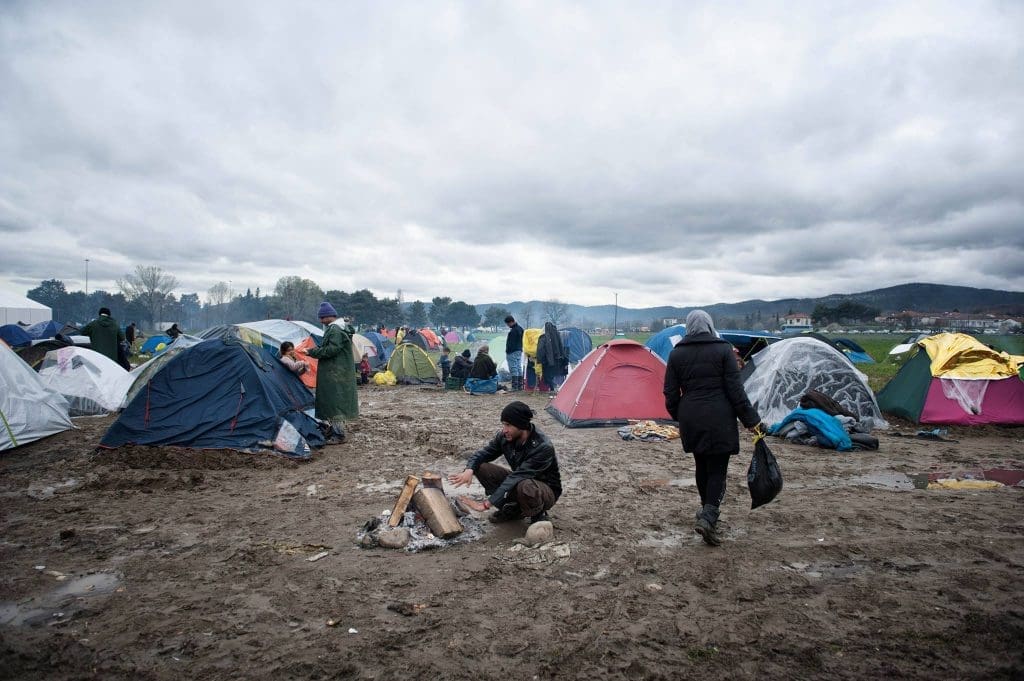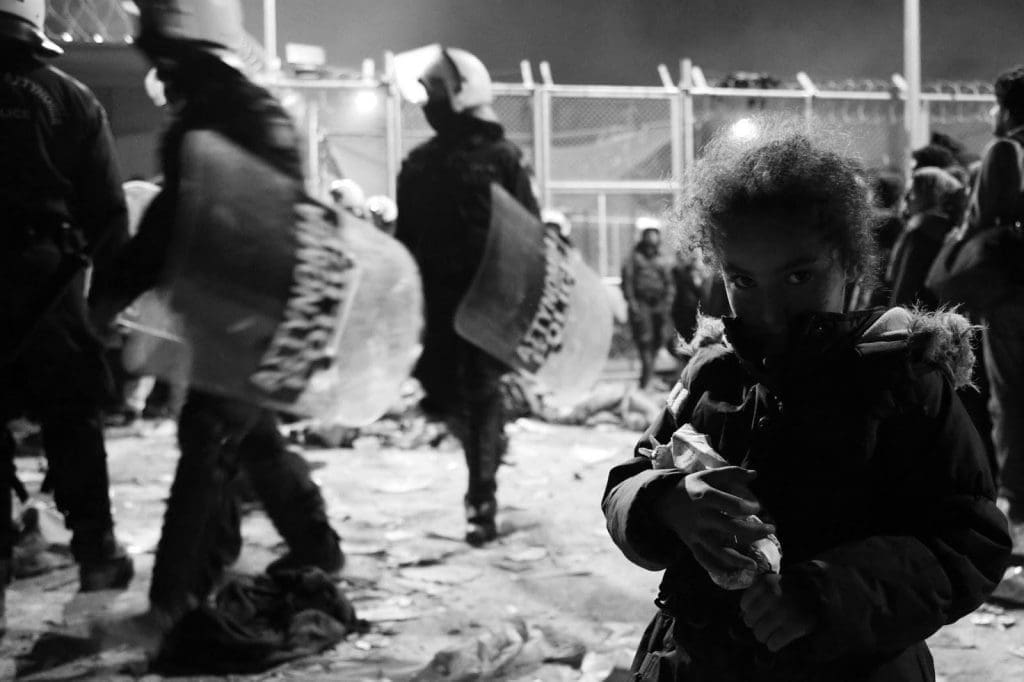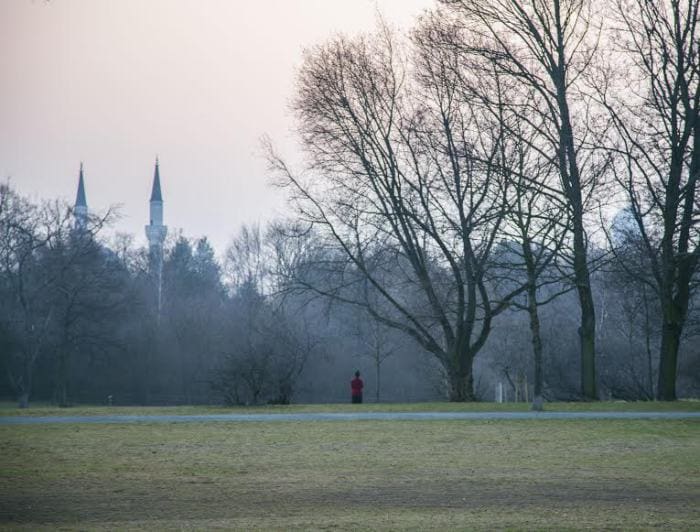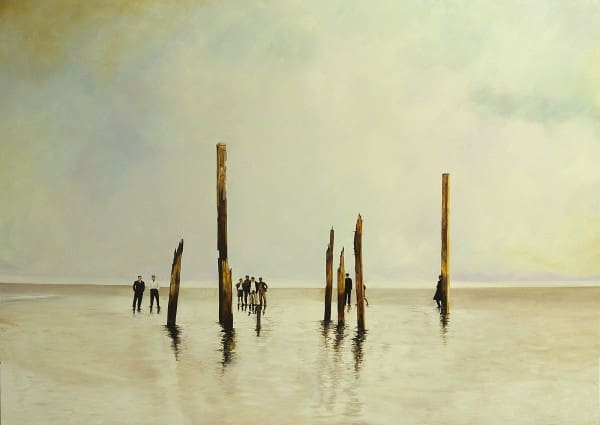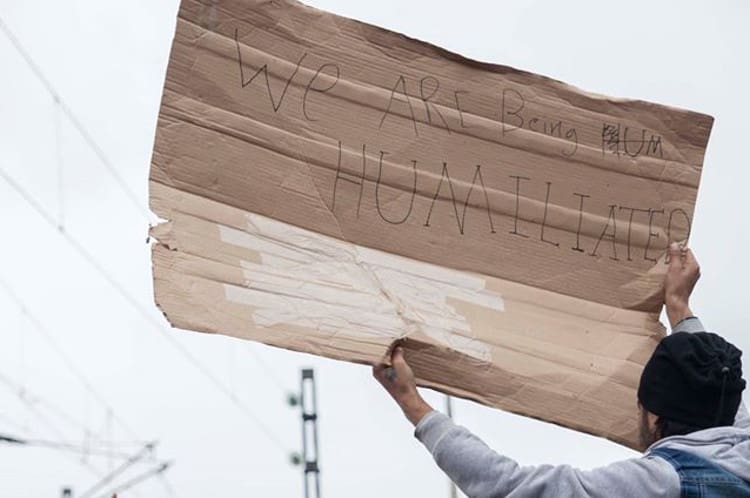AntiNote: We call ourselves a writers collective, and yet words have been failing us. Both in the standard sense of the idiom (in which we are struck speechless by—need we even say it—the latest unspeakable horror, the silence around which, whatever it is, we simultaneously condemn as a sign of human failing, of ignorance or toleration or resignation) and also in the sense that the words we do scribble or scream will never have the material impact we imagine they ought to.
We cannot give up on the people stranded along the so-called Balkanroute, however, and will not. It is maddening to have to repeat the same words we were using a year ago, and more so considering the vastly distracted media context into which our voices disappear this time around; there are so many other things to shout about right now, and the border crisis in Europe is “old news,” to boot. But listen: conditions are dire in Greece, Serbia, France, and everywhere else refugees continue to be blocked, caged, expelled, neglected, harassed, forgotten, reviled—and once again, it looks like it will be getting much worse. Once again, as it in fact never ceased to be, it is up to all of us together, it is now or never.
The Filoxenia project in Thessaloniki is one independent intervention among many others of varying degrees of audacity around Greece and elsewhere in Europe. They deserve our solidarity and support, at the very least for having done us all a solid by speaking the words we have not been able to muster (again).
Following their short rejoinder, republished from their blog View from the Ground, we have appended another assessment of the situation from on the ground in Samos, where, yes, refugees continue to arrive by boat and, yes, the state and institutional structures intended to “handle” the situation are still fucking it up. Bad. Thanks and solidarity go once again to the fine folks at Samos Chronicles.

Winter is coming.
By Miguel Dawson-Ambiado for Filoxenia – View from the Ground
13 October 2016 (original post)
“Winter is coming!” Thanks to Game of Thrones, this has become a familiar refrain. Here in Greece, it has become a mantra. Any time we think ahead…winter is coming…everyone is really worried about the imminent change of conditions and the difficulties it will bring. There is a chill in the air. It feels like something is shifting and it is accompanied by a sense of foreboding. A stock of blankets have been kept in the building as a reserve to distribute in camps or to displaced refugees in the city when the winter sets in.
‘In what language does rain fall over tormented cities?‘
—Pablo Neruda
For the past week, Thessaloniki has been miserable. An ominous gray blanket settled in the bowl of the mountains, followed by three days of relentless rainfall. Raindrops jump back off the pavement. The roads are rivers. Shoes converse in squelches, hoods are pulled over heads and pathways become highways of snails. I feel I am back in England.
We are lucky to be working indoors. It doesn’t take long to get soaked as we unload the truck on a venture to a nearby rubbish dump. A man with a trolley ambles over, ankle deep in the sludge. He has been picking through the waste looking for anything valuable, gutting a sofa in the mud and trash, reclaiming the springs and heaping them on his trolley. We give him a handful of old cables, which he acknowledges with a thank you before returning to the carcass of the sofa. After fifteen minutes in the rain, clothes are damp and we have mud up our legs. It’s okay. At the end of the day we go home to a warm house, a change of clothes, a clean shower and sit in the dry, while rain hammers the patio. Not so in the camps nearby.
Camp life resembles trench warfare. Conditions worsen with the weather. The ground is saturated and puddles flood the gravel pathways to pool in the doorways of tents. Hepatitis A is common. Parasites and illnesses spread lightning-quick in these poor conditions where there are only basic facilities. Imagine your worst experience of a wet festival or camping trip. Now imagine this is your reality day after day, indefinitely. We can’t imagine. This is life here and some have been living in these camps for the past year.
The weather has eased, but the rain has left its mark. It reminds us ‘Winter is coming!’ and we must be prepared. A sense of urgency grows. The news from Calais of the eviction and the hardships of the refugees on all fronts adds to that urgency—we must all pull together.
‘Winter is coming’ …this isn’t fantasy, this is very real.

SNAFU and its Consequences for Refugees on Samos
by Sofiane Ait Chalelet and Chris Jones for Samos Chronicles
16 October 2016 (original post)
“Situation Normal, All Fucked Up”
It is now the middle of October and the weather is still holding fine. But the first heavy rains of the autumn are likely at any time. What then for the hundreds of refugees who are living in the tents inside the “hotspot” camp? From what we can determine no provision has been or is being planned for the coming winter.
The past week has seen the biggest daily arrivals since before the EU/Turkey pact of March 2016, with over 500 this week. Most are from Syria. For some reason the Greek media is giving little publicity to this significant increase. Recent experience tells us that the Turkish government has been fairly effective over the past seven months in keeping down the refugee numbers crossing to the islands. So is this recent increase a sign of Turkey’s growing impatience with the EU over the granting of visas and a not so subtle hint of what might follow if the EU pulls back on its promise?
At the moment all the new arrivals are being packed into the already overcrowded camp.
This week we needed the phone number of the camp manager. No problem, except that we were warned it might be difficult to make contact as the camp manager had only just arrived and was not expected to stay for longer than three weeks. It appears that no one is prepared to take on the job on a long term basis, so camp managers come and go at an extraordinary rate. As one of the NGO bosses here told us, it takes them at least a couple of weeks for the manager to get any kind of grasp on what is involved, and then they have to brief their successor before leaving.
It is a ridiculous situation that such a strategic position is filled in this way. But sadly when it comes to the care of refugees it is all too commonplace. There is an endless turnover of key personnel; there is no effective management; there is no planning or development agenda; the priority is day-to-day maintenance.
The consequences are many. Allocation of accommodation in the camp to newly arriving refugees is chaotic. Families with young children can find themselves in tents while fit, able young adults are housed in cabins. In the past month we have seen the arrival of over 120 new staff to the camp: among their number, we are told, are social workers and psychologists. But they are doing virtually nothing, and seem to sit around all day in their orange waistcoats drinking coffee. There is just one coordinator, who is overwhelmed trying to find ‘placements’ for the new workers.
In the meantime, there are hundreds of young kids running around unsupervised who are desperately in need of structured activities; there are older children now who have learned that self-harm gets them some attention; and there is the pall of depression which hangs like a thunder cloud over the camp and which this week saw a young Pakistani refugee try to end things by pouring petrol over himself. He survived but is badly burned.
It is easy to forget that the nearly two thousand people in the camp is around the same number of students in a large British secondary school. Caring and supporting them is not some sort of unbelievably hard or unreasonable challenge. But here they aren’t even at first base.
Short Termism
Since 20 March the overwhelming majority of arrivals have been held on Samos. Many have now been here for between five and seven months. There is not the constant turmoil of short stays and departures as was the case last year. This ought to have favored better outcomes for refugees by allowing systems and processes to be put in place – systematic children’s activities including education, language classes, recreational activities, and cooking, for example.
But nothing much happens which is systematic and enduring. Much of this has to do with the short term characteristics of the system. It is not just the camp management which is continually changing. A 13-year-old unaccompanied minor from Pakistan told us yesterday how much he had learned from the teachers who held classes in the house where he was staying with nine other youngsters. But he said the teachers were always changing. One week-two weeks and then they are gone and new ones arrive. He didn’t like it.
Same with the lawyers, who are so desperately needed. They too come for similarly short periods of time, as do many of the other volunteers who come to Samos. It would seem that virtually all the services most valued by the refugees are provided on a short term basis, usually by NGOs which can attract professional volunteers (such as teachers, lawyers and therapists). Good as some of these volunteers are, there is a limit to what they can achieve in a few weeks, and most importantly, there is no continuity of care and no corresponding accumulation of experience and expertise.
Promises, promises
There are many reasons for this sad state of affairs. Not the least is that the Greek state is broken. It lacks both competency and capacity. There are many examples which illustrate this reality. On 5 October 2016 Ekathimerini reported that EU officials have warned Greece that they might have to return 509 million euros from the one billion they have been given for refugees this past year, “due to the slow pace at which those funds are being absorbed.” In other words the money is not being spent. The unnamed European Commission official continued: “There is an increasing sense of a country that cannot bring about results in the refugee crisis or in the economy.”
Greece is an easy target; its frailties are well known. But within the EU the intensity with which member states guard their sovereignty—especially with respect to migration, defense, and border management—have made it almost impossible for the EU to control, enforce, and implement key aspects of its refugee policy. So many of these elements, such as relocation to relieve the pressure on Greece and Italy, are not working. Member states refuse to act to fulfill their pledges. Amnesty International recently estimated that at the current rate it will take eighteen years to relocate the refugees now in Greece and Italy. Commitments, high profile at the time they are made, later vanish into thin air. As the Greek deputy foreign minister Nikos Xydakis complained at the end of September:
“…Seven thousand refugees could be immediately relocated from Greece to other EU countries; all formalities for this procedure have been met. But it does not happen. Most EU countries take far too few refugees from Greece, some EU countries do not even respond to our requests.
“The EU Commission said in March this year that we needed four hundred officers from the Asylum Agency EASO. To date only 26 officers have come to the islands. We need extremely more support from the EU countries in tackling the refugee crisis in Greece. I expect that the Europeans will now show solidarity and not only make promises, but also act.”
We can see nothing which suggests a resurgence of European solidarity in the near future. So on the frontier islands such as Samos we will continue to hear the announcements that promise some improvements—getting the kids into school, moving the most vulnerable from the islands to better specialist provision on the mainland, more resources for unaccompanied minors and so on—but then nothing happens. As the Samos Municipality noted in its statement following this week’s meeting with five government ministers in Athens (on 11 October) to discuss the refugee situation on Samos:
“It is obvious that the municipality of Samos welcomes any initiative to address these issues, and we will work with all the relevant authorities to solve it. However, for these efforts to be effective they must be developed in a framework of absolute transparency and compliance with the law and not stay at the stage of promises and simple drawings on paper, as before…
“[T]he problem will not be solved by mere promises nor with announcements of their ‘desirability.’ They require a plan, a process and operation…The time for words, after all, has long since passed. Action is needed now—indeed already by yesterday.”
Little wonder then that refugees and activists on Samos take no notice of official statements of intent, while despite the flow of reports from NGOs and think tanks which endlessly detail and report on the awful conditions in the “hotspots,” compounded by the inappropriate actions of the police, nothing changes. As far as we can see, nothing fundamental will change until and unless the authorities and NGOs start listening to and engaging with refugees. But for that to happen, the system is going to have change its entire approach to the refugees and see them in completely new ways as competent human beings.
Silenced
Nobody in authority here listens to refugees; nobody here asks them what they need or how they could be involved to make life more bearable. There has been no attempt to create any forum where refugees can get their voices heard. There are many groups here who speak passionately on behalf of the refugees but which have no direct input or engagement with the refugees. Time and again refugees have pointed to the wide gulf between themselves and those who are paid to help them. There are no office hours for refugees and their problems, yet “wait, come back tomorrow, we close at five p.m.” are familiar responses to the refugees.
Many of the refugees in the camp are acute observers of what goes on around them. Many have little else to do all day but look and watch. They see the hundreds of new people coming to work in the camp but doing nothing. They see the offices where refugees are never invited inside but conduct their business from the doorway. They see the money spent on the ephemera – the vests and uniforms, the fancy engraved doors of the MSF office, the handsome vehicles, the flags; they can’t avoid seeing the refugee professionals in the bars, cafés and restaurants. They know that some of these senior staff pay over a thousand euros rent for their accommodation, and have cleaners and subsidized food.
The vast majority of the refugees have nothing, not one cent after being here for six to seven months. That is why so many stay in the camp and rarely venture into the town. That is why we no longer see advertising signs in Arabic outside the shops; that is why you won’t see piles of sleeping bags for sale outside the tourist shops like last year. These refugees have little or no money after being stuck on Samos for so many months.
There is no transparency when it comes to funding, whether to state agencies or NGOs, on Samos. We have no clear idea of what money comes in, how it is distributed or spent. But the ninety-plus rental cars we have seen parked outside the camp fences would alone suggest that the funding is significant. What is clear, though, is that the refugees are not the principal beneficiaries. There is, for example, no provision to pay for the ferry fares to Athens when the refugees do get papers to leave the island. There is no help given to help refugees find jobs or find houses and rooms to rent when they decide, as many now do, to stay on Samos to complete their paperwork. Many realize that Athens is not the place to be if you have no contacts there or a place to stay. But there are no systems through which they communicate any of their needs or demands.
So each day rolls into the next, and SNAFU remains the reality.

Featured image source: Filoxenia International (Facebook). All other images: Lois Simac via Filoxenia – View from the Ground

